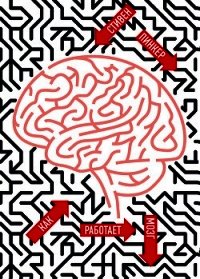Язык как инстинкт - Пинкер Стивен (книги серии онлайн .TXT) 📗
Seidenberg M. S. & Petitto L. A. 1987. Communication, symbolic communication, and language: Comment on Savage-Rumbaugh, McDonald, Sevcik, Hopkins, and Rupert 1986 // Journal of Experimental Psychology: General, 116. P. 279–287.
Seidenberg M. S., Tanenhaus M. K., Leiman M. & Bienkowski M. 1982. Automatic access of the meanings of words in context: Some limitations of knowledge-based processing // Cognitive Psychology, 14. P. 489–537.
Selkirk E. O. 1982. The syntax of words. Cambridge, Mass.: MIT Press.
Shatz C. J. 1992. The developing brain. Scientific American, September.
Shepard R. N. 1978. The mental image // American Psychologist, 33. P. 125–137.
Shepard R. N. 1987. Evolution of a mesh between principles of the mind and regularities of the world // J. Dupre (Ed.), The latest on the best: Essays on evolution and optimality. Cambridge, Mass.: MIT Press.
Shepard R. N., and Cooper L. A. 1982. Mental images and their transformations. Cambridge, Mass.: MIT Press.
Shevoroshkin V. 1990. The mother tongue: How linguists have reconstructed the ancestor of all living languages // Sciences, 30. P. 20–27.
Shevoroshkin V. & Markey T. L. 1986. Typology, relationship, and time. Ann Arbor, Mich.: Karoma.
Shieber S. 1994. Lessons from a restricted Turing Test. Communications of the Association for Computing Machinery.
Shopen T. (Ed.) 1985. Language typology and syntactic description, 3 vols. New York: Cambridge University Press.
Simon J. 1980. Paradigms lost. New York: Clarkson Potter.
Singer P. 1992. Bandit and friends // New York Review of Books, April 9.
Singleton J. & Newport E. 1993. When learners surpass their models: the acquisition of sign language from impoverished input. Unpublished manuscript, Department of Psychology, University of Rochester.
Siple P. (Ed.) 1978. Understanding language through sign language research. New York: Academic Press.
Slobin D. I. 1977. Language change in childhood and in history // Macnamara (Ed.), Language learning and thought. New York: Academic Press.
Slobin D. I. (Ed.) 1985. The crosslinguistic study of language acquisition, Vols. 1 & 2. Hillsdale, N. J.: Erlbaum.
Slobin D. I. (Ed.) 1992. The crosslinguistic study of language acquisition, Vol. 3. Hillsdale, N. J.: Erlbaum.
Smith G. W. 1991. Computers and human language. New York: Oxford University Press.
Sokal R. R., Oden N. L. & Wilson C. 1991. Genetic evidence for the spread of agriculture in Europe by demic diffusion // Nature, 351. P. 143–144.
Solan L. M. 1993. The language of judges. Chicago: University of Chicago Press.
Spelke E. S., Breinlinger K., Macomber J. & Jacobson K. 1992. Origins of knowledge // Psychological Review, 99. P. 605–632.
Sperber D. 1982. On anthropological knowledge. New York: Cambridge University Press. Sperber, D. 1985. Anthropology and psychology: Toward an epidemiology of representations // Man, 20. P. 73–89.
Sperber D. 1994. The modularity of thought and the epidemiology of representations // Hirschfeld & Gelman (Eds.), Mapring the mind: Domain specificity in cognition and culture. New York: Camblidge University Press.
Sperber D. & Wilson D. 1986. Relevance: Communication and cognition. Cambridge, Mass.: MIT Press.
Sproat R. 1992. Morphology and computation. Cambridge, Mass.: MIT Press.
Staten V. 1992. Ol’ Diz. New York: HarperCollins.
Steele S. (with Akmajian A., Demers R., Jelinek E., Kitagawa C., Oehrle R., and Wasow T.) 1981. An Encyclopedia of AUX: A Study of Cross-Linguistic Equivalence. Cambridge, Mass.: MIT Press.
Stringer C. B. 1990. The emergence of modern humans // Scientific American, December.
Stringer C. B. & Andrews P. 1988. Genetic and fossil evidence for the origin of modern humans // Science, 239. P. 1263–1268.
Stromswold K. J. 1990. Learnability and the acquisition of auxiliaries. Doctoral dissertation, Department of Brain and Cognitive Sciences, MIT.
Stromswold K. J. 1994. Language comprehension without language production. Presented at the Boston University Conference on Language Development.
Stromswold K. J. 1994. The cognitive and neural bases of language acquisition // M. S. Gazzaniga (Ed.), The cognitive neurosciences. Cambridge, Mass.: MIT Press.
Stromswold K. J., Caplan D. & Alpert N. 1993. Functional imaging of sentence comprehension. Unpublished manuscript, Department of Psychology, Rutgers University.
Studdert-Kennedy M. 1990. This view of language // Pinker & Bloom. 1990.
Supalla S. 1986. Manually coded English: The modality question in signed language development. Master’s thesis, University of Illinois.
Swinney D. 1979. Lexical access during sentence comprehension: (Re)consideration of context effects // Journal of Verbal Learning and Verbal Behavior, 5. P. 219–227.
Symons D. 1979. The evolution of human sexuality. New York: Oxford University Press.
Symons D. & commentators. 1980. Précis and multiple book review of «The Evolution of Human Sexuality» // Behavioral and Brain Sciences, 3, 171–214.
Symons D. 1992. On the use and misuse of Darwinism in the study of human behavior // Barkow, Cosmides & Tooby, 1992.
Tartter V. C. 1986. Language processes. New York: Holt, Rinehart & Winston.
Terrace H. S. 1979. Nim. New York: Knopf.
Terrace H. S. Petitto L. A., Sanders R. J. & Bever T. G. 1979. Can an ape create a sentence? // Science, 206. P. 891–902.
Thomas L. 1990. Et cetera, el cetera: Notes of a wordwatcher. Boston: Little, Brown.
Thomason S. G. 1984. Do you remember your previous life’s language in your present incarnation? // American Speech, 59. P. 340–350.
Tiersma P. 1993. Linguistic issues in the law // Language, 69. P. 113–137.
Tooby J. & Cosmides L. 1989. Adaptation versus phylogeny: The role of animal psychology in the study of human behavior // International Journal of Comparative Psychology, 2. P. 105–118.
Tooby J. & Cosmides L. 1990a. On the universality of human nature and the uniqueness of the individual: The role of genetics and adaptation // Journal of Personality, 58. P. 17–67.
Tooby J. & Cosmides L. 1990b. The past explains the present: Emotional adaptations and the structure of ancestral environments // Ethology and sociobiology, 11. P. 375–424.
Tooby J. & Cosmides L. 1992. Psychological foundations of culture // Barkow, Cosmides, & Tooby. 1992.
Trueswell J. C., Tanenhaus M. & Garnsey S. M. 1994. Semantic influences on parsing: Use of thematic role information in syntactic ambiguity resolution // Journal of Memory and Language, 33. P. 285–318.
Trueswell J. C., Tanenhaus M. & Kello C. 1993. Verb-specific constraints in sentence processing: Separating effects of lexical preference from garden-paths // Journal of Experimental Psychology: Learning, Memory, and Cognition, 19(3). P. 528–553.
Turing A. M. 1950. Computing machinery and intelligence // Mind, 59. P. 433–460.
Voegelin C. F. & Voegelin F. M. 1977. Classification and index of the world’s languages. New York: Elsevier.
Von der Malsburg C. & Singer W. 1988. Principles of cortical network organization // P. Rakic & W. Singer (Eds.), Neurobiology of neocortex. New York: Wiley.
Wald B. 1990. Swahili and the Bantu languages // B. Comrie (Ed.), The world’s major languages. New York: Oxford University Press.
Wallace R. A. 1980. How they do it. New York: Morrow.
Wallesch C.-W., Henriksen L., Kornhuber H.-H. & Paulson O. B. 1985. Observations on regional cerebral blood flow in cortical and subcortical structures during language production in normal man // Brain and Language, 25, 224–233.




